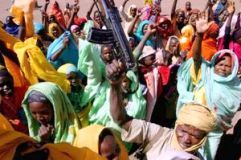Sudanese rebel leader says he will not send his troops to fight Darfur region
By CHRIS TOMLINSON, Associated Press Writer
NAIROBI, Kenya, Jan 8, 2005 (AP) — A southern Sudanese rebel leader, speaking the day before he is to sign a historic peace agreement with the government, said Saturday he will not send his forces to fight in the western Darfur region to end a worsening crisis there.

|
|
Villagers cheer Sudan Liberation Army (SLA) rebels at Deribat, in the mountains of South Darfur, western Sudan November 16, 2004. |
John Garang, leader of the Sudan People’s Liberation Army, said that despite the peace deal he has reached with the government after 21 years of civil war, he does not consider his country to be at peace until all fighting has stopped.
He said peace talks were the only way to end the fighting in Darfur and rejected a military solution.
“I will not fight any other Sudanese,” Garang said. “We want a fair and just political settlement for Darfur.”
Non-Arab rebel groups took up arms in February 2003 against what they saw as years of neglect and discrimination by the mostly Arab government against Sudanese of African origin.
The government responded with a counterinsurgency campaign in which the Janjaweed, an Arab militia, has allegedly committed wide-scale abuses against the African population.
About 70,000 people have been killed by disease, hunger and attacks since last March, and nearly 2 million are believed to have fled their homes. Many more are believed to have died in the fighting.
Even before the southern deal was reached, officials inside and outside Sudan had linked the two conflicts, saying peace in the civil war would be key to making progress on the so-far intractable Darfur front.
Efforts for a Darfur solution have gone erratically — a Nov. 9 cease-fire signed in Abuja, Nigeria, between the government and the two main rebel groups has been repeatedly broken by both sides. And new insurgent groups have recently arisen to add strength to the resistance.
“If I am invited, I will go. If I’m not, I will ask to be invited,” Garang said of the Abuja talks.
In August, Garang proposed a 30,000-strong peacekeeping force to “prevent genocide” in Darfur.
He said a third of the force could consist of Sudanese army troops, while his group and international forces, preferably under the auspices of the African Union, would each provide a third of the force.
There now are 833 African peacekeepers on the ground in Darfur, an area the size of France.
But Garang also acknowledged that a lot of work still needs to be done to guarantee that the peace agreement to be signed Sunday will be implemented. He said he will immediately enter into talks with other southern militias to persuade them to accept the deal.
The government must also persuade northern opposition groups to accept the deal, struck after eight years of talks in neighboring Kenya.
The comprehensive deal spells out how to share power and natural wealth, what to do with their armed forces during a six-year transition period and how to administer three disputed areas in central Sudan. After six years of autonomy, southerners will also be given a chance to decide whether to remain part of Sudan, or become independent.
